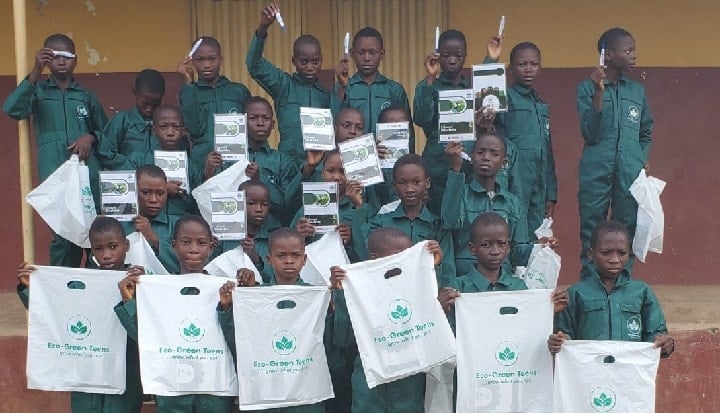The Covid-19 pandemic had a socio-economic impact on the Nigerian economy, which led to increased food prices making basic staple foods (maize, cowpea, green leafy vegetable etc.) difficult to access for both low and middle-income classes [1]. The Food and Agriculture Organization (FAO) also predicted that over 19 million Nigerians would face food insecurity in the second half of 2022 due to the Russian-Ukraine war [2]. And to combat this issue and promote sustainable agriculture, a team consisting of four individuals (Akintayo Victoria Oluwapelumi, Odunfa Temitayo Moyosore, Odunlami Love Kayode and Ogunleye Kehinde Timilehin) from Nigeria designed the Eco-Green Teens Project, which focused on educating rural teenagers in government-owned junior secondary schools and also addresses the United Nations Sustainable Development Goals (SDGs) 1, 2 and 11- Zero Hunger, No Poverty and Sustainable Cities and Communities.
The program taught financial literacy, sustainable agriculture skills, and promoted a bio-circular economy to help eradicate poverty and hunger in a post-Covid era within 12 weeks (20th October, 2022- 19th January, 2023) with the grant received from the Global Youth Mobilization(GYM) cycle 6 in September, 2022 [3]. GYM is a movement of young people taking action to improve their lives and local communities in a post Covid-19 world. GYM is supported by the world’s largest global youth organizations (World Health Organization and United Nations Foundation) to address the negative impact of the pandemic on young people and support them to restore social systems, economies and the environment. GYM provides a new platform to inspire young people to take active role in the immediate and long-term recovery from the impact of Covid-19 and the resources necessary to make a meaningful difference.
[iframe width=”318″ height=”315″ src=”https://www.youtube.com/embed/L_lin_Ik6og” title=”YouTube video player” frameborder=”0″ allow=”accelerometer; autoplay; clipboard-write; encrypted-media; gyroscope; picture-in-picture; web-share” allowfullscreen></iframe]
Thirty-four (34) students in Junior Secondary School 2 putting into consideration gender equality participated in the implementation stage of the Eco-Green Teens project at Ikolaba High School, Agodi-GRA, Ibadan, Oyo State, Nigeria and the students worked in three teams which promoted collaboration and efficiency to learn how to cultivate green leafy vegetable, cowpea, tomatoes and pepper while also engaging in a 21-day challenge schedule to make their environment eco-friendly. As part of the Eco-Green Teens Project, the students read success stories of two young professionals who are experts in sustainable agriculture in Nigeria [4, 5]. The students caught a glimpse of the wide range of opportunities in the agricultural sector while also learning the importance of entrepreneurship, financial literacy and marketing skills in agriculture. And in the short period the students also experienced the downside of agriculture as they had difficulty accessing water to water the plants, harsh weather conditions associated with the dry season and rodents invasion that deprived a bountiful harvest of the cowpea planted.
Nevertheless, the goals for the first phase of the Eco-Green Teens project which was to make poor students see the beauty and importance of growing what they eat was achieved. And to mark the achievement of the implementation phase of the Eco-Green Teens project, the team organized a closing ceremony which brought together the parents of the trained students and friends of the project with a guest speaker [6] who encouraged the students and talked more about the future of agriculture in our local communities.
As Finley said, “Growing your own food is like printing your own money” and as an opportunity to boost agricultural production in an agriculturally viable land like Nigeria, the Eco-Green Teens will continue to leverage on the community of the first trainees to reach a larger audience [7].
“Teenagers can build a sustainable source of income by making use of the limited resources around them in the rural communities to grow fresh and nutritious food which will contribute to healthy living”.
Odunlami Love Kayode (DAAD Scholar), University of Ghana, West Africa Centre for Crop Improvement










